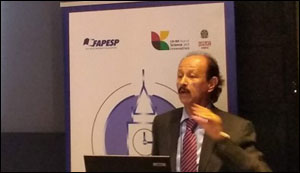Lithium-air batteries can store energy for cars, houses and industry
19. 2. 2019 | FAPESP | agencia.fapesp.br/home
Current lithium ion battery technology will probably not be able to handle the coming decades’ huge demand for energy. It is estimated that by 2050, electricity will make up 50% of the world’s energy mix. Today that rate is 18%. But installed capacity for renewable energy production is expected to increase fourfold. This will require batteries that are more efficient, cheaper and environmentally friendly.
One of the alternatives being studied today in many parts of the world is the lithium-air battery. The lithium-air battery, currently functioning only on a laboratory scale, uses ambient oxygen as a reagent. The battery stores additional energy through an electrochemical reaction that results in the formation of lithium oxide.

But turning experiments into commercially viable products involves understanding the fundamentals of the electrochemical reactions that occur in the proces and development of new materials that allow us to leverage desirable reactions and minimize or avoid undesirable ones. The idea is to keep track of the reactions that occur in dynamic experiments and the different chemical species that are formed, even if temporarily. Otherwise, some of the stages in the process get lost and the battery becomes inefficient in terms of charge time and duration of charge.
Read more at FAPESP
Image Credit: André Julião, FAPESP
-jk-




